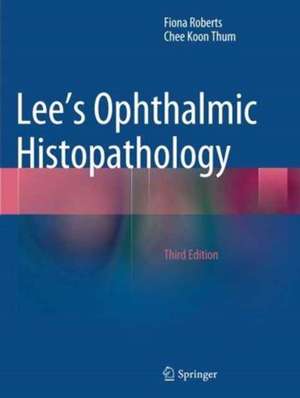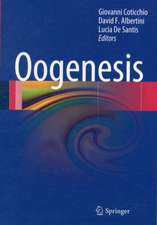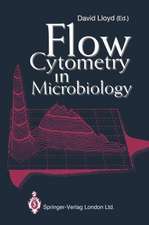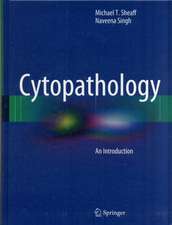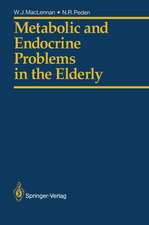Lee's Ophthalmic Histopathology
Autor Fiona Roberts, Chee Koon Thumen Limba Engleză Paperback – oct 2016
Illustrations include macro specimens, microscopic specimens and illustrations of additional techniques - immunohistochemistry, molecular analyses and electron microscopy - to help both the pathologist and ophthalmologist understand the process that a specimen must go through prior to producing a report and how these various techniques help to refine the diagnosis.
The third edition of Lee’s Ophthalmic Histopathology is an invaluable reference source for ophthalmic pathologists, general pathologists and ophthalmologists.
| Toate formatele și edițiile | Preț | Express |
|---|---|---|
| Paperback (2) | 876.19 lei 6-8 săpt. | |
| Springer International Publishing – 16 aug 2022 | 876.19 lei 6-8 săpt. | |
| SPRINGER LONDON – oct 2016 | 1191.42 lei 38-44 zile | |
| Hardback (1) | 1210.62 lei 3-5 săpt. | |
| Springer International Publishing – 15 aug 2021 | 1210.62 lei 3-5 săpt. |
Preț: 1191.42 lei
Preț vechi: 1254.13 lei
-5% Nou
Puncte Express: 1787
Preț estimativ în valută:
228.01€ • 237.16$ • 188.23£
228.01€ • 237.16$ • 188.23£
Carte tipărită la comandă
Livrare economică 11-17 aprilie
Preluare comenzi: 021 569.72.76
Specificații
ISBN-13: 9781447171171
ISBN-10: 1447171179
Pagini: 493
Ilustrații: XXVII, 466 p. 574 illus., 535 illus. in color.
Dimensiuni: 210 x 279 x 30 mm
Ediția:Softcover reprint of the original 3rd ed. 2014
Editura: SPRINGER LONDON
Colecția Springer
Locul publicării:London, United Kingdom
ISBN-10: 1447171179
Pagini: 493
Ilustrații: XXVII, 466 p. 574 illus., 535 illus. in color.
Dimensiuni: 210 x 279 x 30 mm
Ediția:Softcover reprint of the original 3rd ed. 2014
Editura: SPRINGER LONDON
Colecția Springer
Locul publicării:London, United Kingdom
Cuprins
Examination of the Globe: Technical Aspects.- The Traumatised Eye.- “Absolute Glaucoma”.- Retinal Vascular Disease.- Intraocular Tumours.- Ocular Inflammation.- Treatment of Retinal Detachment.- The Malformed Eye.- “Autopsy Eye”: the Eye in Systemic Disease.- Biopsy of the Eyelid, the Lacrimal Sac, and the Temporal Artery.- The Conjunctival Biopsy.- The Orbit: Biopsy, Excision Biopsy, and Exenteration Specimens.- The Corneal Disc.- Lens.
Recenzii
“This is a very comprehensive atlas and textbook on the macroscopic and microscopic histopathology of the embryonic, childhood, adolescent and adult eyes. … I recommend this book for all ophthalmology residents, fellows, and experts of eye diseases. Internists and pathologists will benefit from the highest quality full color details presented here. I have no reservations in recommending this book.” (Joseph J. Grenier, Amazon.com, September, 2015)
The approach of the book is unconventional; chapters reflect the categories of specimens sent to pathologists, rather than the conventional anatomical approach that only really works if one already has Ophthalmic Pathology experience. [T]his is unequivocally the "textbook of choice" for the trainee ophthalmic pathologist and general histopathologist. It is also highly recommended to trainee and senior ophthalmologists, and as a reference book to ophthalmic professionals and researchers. (MA Parsons, Eye News, 2004;10(4):84)
The ‘hands-on’ structure should make this book a mandatory item in the laboratory. (Holger Baatz, Ophthalmologica 2003;217(5):5)
[T]he intention of the author is to provide general pathologists with a concise but nevertheless complete bench-book and guide them through the intricacies of eye dissection, appropriate sampling, and microscopic examination. New data from literature have been included. The author's goals have been fully
met. The coverage is systematic and the writing exceptionally clear. This is an ideal book for practicing general pathologists who only occasionally see eye specimens and usually need considerable guidance and support while examining ophthalmic biopsies or surgically resected bulbi and other surgical ophthalmic specimens. As a general pathologist, I have consulted this book and found it to be a valuable source of information. Even though there are several excellent textbooks of ophthalmic pathology, this one would be definitely my first choice.(Doody’s Book Review Service™, 5 stars, Ivan Damjanov)
The approach of the book is unconventional; chapters reflect the categories of specimens sent to pathologists, rather than the conventional anatomical approach that only really works if one already has Ophthalmic Pathology experience. [T]his is unequivocally the "textbook of choice" for the trainee ophthalmic pathologist and general histopathologist. It is also highly recommended to trainee and senior ophthalmologists, and as a reference book to ophthalmic professionals and researchers. (MA Parsons, Eye News, 2004;10(4):84)
The ‘hands-on’ structure should make this book a mandatory item in the laboratory. (Holger Baatz, Ophthalmologica 2003;217(5):5)
[T]he intention of the author is to provide general pathologists with a concise but nevertheless complete bench-book and guide them through the intricacies of eye dissection, appropriate sampling, and microscopic examination. New data from literature have been included. The author's goals have been fully
met. The coverage is systematic and the writing exceptionally clear. This is an ideal book for practicing general pathologists who only occasionally see eye specimens and usually need considerable guidance and support while examining ophthalmic biopsies or surgically resected bulbi and other surgical ophthalmic specimens. As a general pathologist, I have consulted this book and found it to be a valuable source of information. Even though there are several excellent textbooks of ophthalmic pathology, this one would be definitely my first choice.(Doody’s Book Review Service™, 5 stars, Ivan Damjanov)
Notă biografică
Fiona Roberts, Southern General Hospital, Glasgow, UK
Chee Koon Thum, Western General Hospital, Edinburgh, UK
Chee Koon Thum, Western General Hospital, Edinburgh, UK
Textul de pe ultima copertă
Completely revised and updated, this well-illustrated and practically-oriented text has retained its general layout and style and division into specimen-type based chapters. The visual image remains key to explaining the pathological processes and this is facilitated by full colour photography throughout the text. The book emphasizes pertinent recent advances which augment the morphological study of disease. There is updated information on clinically important aspects, immunohistochemistry, tumour cytogenetics and molecular biology.
Illustrations include macro specimens, microscopic specimens and illustrations of additional techniques - immunohistochemistry, molecular analyses and electron microscopy - to help both the pathologist and ophthalmologist understand the process that a specimen must go through prior to producing a report and how these various techniques help to refine the diagnosis.
The third edition of Lee’s Ophthalmic Histopathology is an invaluable reference source for ophthalmic pathologists, general pathologists and ophthalmologists.
Illustrations include macro specimens, microscopic specimens and illustrations of additional techniques - immunohistochemistry, molecular analyses and electron microscopy - to help both the pathologist and ophthalmologist understand the process that a specimen must go through prior to producing a report and how these various techniques help to refine the diagnosis.
The third edition of Lee’s Ophthalmic Histopathology is an invaluable reference source for ophthalmic pathologists, general pathologists and ophthalmologists.
Caracteristici
Specimen-based chapter layout Extensive colour illustrations Recent advances explained
